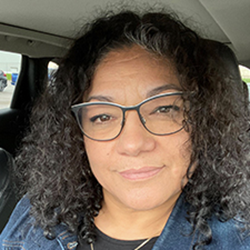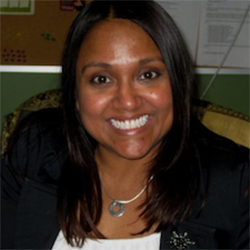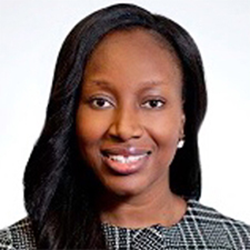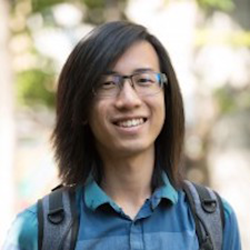Maria Macias

Family and Intimate Partner Violence Team Supervisor, Peel Children's Aid Society
Social Work, Bachelor of Social Work (BSW)
Graduate Program in Social Work, Master of Social Work (MSW)
What led you to become a social worker?
I am originally from Chile in South America, and I grew up in a time of political turmoil and under a very oppressive dictatorship. My mom was very involved with community organizing and development and she encouraged us from a very early age to be interested in Social Justice issues. My first experience working with vulnerable children was when I was 13 years old. I was a camp counsellor for children who lived in extreme poverty and that is when my passion for community engagement and activism began.
As a result of the work that my mother did while in Chile, our family was exiled, and we came to Canada as refugees in 1987. When thinking career options, I gravitated towards community work and education because it was a field that I was very interested in. I applied to George Brown College, to complete the two-year Community Worker Diploma. I was then hired to work at a women’s shelter as a Violence Against Women Counsellor and I worked in this role for many years.
In 2007, I decided to apply to York University to complete my BSW. It took me 3 years complete, while working full time. When I was a year away from completing my BSW, I realized that an MSW could open more employment possibilities and so, last minute, I applied for my MSW and said, “let’s see what happens”! I was happy when I got accepted into York University’s MSW program because I really loved the program! The flexibility of the part-time MSW Program was great because I could be a mom and work full-time and go to school and so it worked out well.
Could you talk about what led you to your current position?
Before completing my BSW, I worked in a community outreach program that supported women who have experienced intimate partner violence. Once I gained my MSW, I was offered a position as a Program Supervisor for this Community Outreach Program. After five years in this role, I wanted to explore other opportunities which led me to apply to Peel CAS to work within their domestic violence team. I was in this job for 10 months before transferring to Halton CAS where I worked full-time in the regional domestic violence team. I was working with this team for another 10 months when an amazing opportunity came up where I could manage a housing program with an organization called Services and Housing in the Province. Unfortunately, the funding was terminated, and the program ended. Another position came up with Peel CAS, I decided to go back to the domestic violence team which is where I currently work. It’s interesting because I’ve worked within one organization for 25 years and then within five years, I moved roles 3 times. I’ve been in my current role for three years in March. In addition, I have also worked as a Crisis Relief Counsellor with Victim Services of Peel and I’m also a Faculty Advisor with York’s School of Social Work.
What does a typical work week look like in your current role as a Child Protection Worker within the domestic violence team at Peel CAS?
I work with families on a long-term basis which means, when the assessors do an initial investigation, they will decide if the family will need to do ongoing work or receive ongoing supports. My collogues and I specifically support families who are experiencing Family and Intimate Partner violence and we spend most of our time working on the effects the violence has had on the children as well as creating long term safety planning and building social networks with the families we support. In this role we do a lot of advocacy within the court system, we focus on engaging fathers and helping them access the supports needed to break the cycle of violence and build positive supports with their children.
We work with both partners, even if they are not currently together, to help them work on co-parenting in a way that is healthy for the children. We do a lot of referrals for individual and couples counselling and counselling for the children when needed. We try to set goals with the families which helps them to identify their needs. One of the things that we are fortunate in this role is that a lot of families want to work with us. Once they have identified the need, and when they agree to the supports, we can work together to accomplish their goals. In comparison, within other child welfare positions, that tend to receive more push back from families because of the power that staff hold as child protection workers.
What I really enjoy about this position is working together with the families. When I introduce myself, I say that I’m walking alongside to support them and I’m not here to tell them what to do. I really like to engage with everyone in the family by working with the children and sometime with extended family members to identify the family’s support networks. When we first meet, we talk about the power differential as they might have preconceptions of my role. I ask them what their goals are and how would they like to move forward so that in 6 months, we can accomplish as much as we have set out to do. After six months, there’s an evaluation to see if the family will need more support, or if the family agrees that we are ready to close the file.
In what ways do you see the critical social work approach adding value or benefiting your practice?
In every way to be honest, my initial education was in community development work and focused on social justice work and but there wasn’t much critical thinking and reflection. When I started my BSW, I realized that the framework aligned with how I see life and what I believe Social Work should be. My first course at York was an elective in Woman’s Studies and I still remember how excited I was every time I would go to class and be part of discussions and listened to stories, and I would learn so much! I am intentional in the way I critically look at different situation and how I can challenge my own vies and values through practice.
I am conscious that sometimes thinking critically can be quite difficult because it means that we need to look at ourselves and our own privilege and acknowledge the power differential that exists between us and the people with work with. It is important to figure out who to address this power differential in our everyday practice. I try to be intentional in the way I implement the knowledge I gained through my education at York into practice. I ask clients to help me understand their experiences, I allow them to guide our discussions and the supports we put in place. I do not enter their lives as an expert, but I do it from a place of curiosity and with an open mind so that I do not do more harm than good in my interactions with the people I support.
How has your role changed during the pandemic?
For the first initial six months, we were doing a lot of virtual meetings instead of going out to see clients, this was the biggest difference for us. Throughout this time, I noticed that we were supporting families more actively and as we became more active in their lives, we also became closer. Many families were reaching out and calling us because they, most likely, were feeling quite isolated. People would reach out to me about school issues, about their children’s MH, about their own struggles and the relationship between me and the families I supported became more fluid.
I also noticed that Intimate Partner increased in a lot of situations because of the many stresses caused by the pandemic. People were losing their jobs; parents were at home together which many times resulted in more conflict. Families were more isolated and disconnected from their support’s network. Alongside everything, new things would come to light because of all the crisis that people were living under and so, cases were more critical and active during this time. I’ve also noticed that we were doing more ongoing counselling with families as opposed to going to check in and leaving.
What are a few things you really enjoy about your current role and what have you found challenging?
In my role at Peel CAS, I’m currently the Co-Chair of the Diversity and Inclusion Committee and I’m a Field Placement Supervisor for a York University BSW student. These roles energize me and allow for a balance in between my front-line work and larger engagement within the organization.
What I like about Peel CAS is that we are moving towards a more anti-oppressive practice. I really enjoy that Peel CAS is focused on including the diverse communities that we serve in the Peel Region by creating partnerships and bringing their voices to the table to help identify the needs of the community. As well, I really enjoy the opportunity to mentor others and so when I can supervise a student or when a new staff comes onboard, I always volunteer to help or provide support. I’m very passionate to help others learn and develop their skills and these opportunities motivate me.
What I find challenging is the view that the community has of Child Welfare organizations, we cannot ignore the history that Child welfare has and how it has negatively impacted some communities more than others. As a Child Welfare worker, I visit families and communities who don’t fully trust us, but I believe that through constant and intentional engagement, we can help to rebuild trust. The caseload can be very busy at times. There are a lot of outcomes to meet and goals to accomplish, forms to write and reports to complete, timelines that you must complete, six months reviews, plans of services, and so there is a lot of multitasking and a need to have strong time management skills.
What did you take away from York’s School of Social Work program?
One thing that I try to remember is to not become comfortable in the work I am doing. With everything that I’ve learned about critical theory and the way to question everything, and I try to bring that into my practice. Being a Faculty Advisor has helped me to continuously challenge myself and my views, the conversations I have with the students keep me engaged and energized.
I find that I have a desire to learn and challenge myself by constantly questioning, asking, and researching, about how to be a voice for those who have a hard time finding theirs. I’ve learned at York that we have power, and we must use it wisely, we can’t just sit quietly and comfortably when something does not feel right or is unjust. I understand that I have a responsibility to speak up. This relates back to how I interact with clients because I intentionally have these conversations with my clients where I identify how people see my role. I usually ask my clients questions to better understand where they are coming from and to help them to start figuring the answers for themselves. For example, with dads I ask them about their experiences growing up, about their family life, this helps me understand their life experiences inform their relationships. If they grew up experiencing violence as children, they may feel that dealing with conflict with violence is normal. My goal is to help fathers understand that it isn’t completely their fault but a result of a deeply problematic system. Through these conversations, they identify how their own experiences of oppression affect their current relationships, and it helps to ease some of the guilt and shame and, instead, they feel a little more empowered to make healthier choices.
What advise do you have for a current student or a new social work grad?
Keep the same energy level you have when you first graduated and find ways to keep that level later in your career. For me, being a social worker isn’t limited to sitting behind a desk counselling someone, because we can do amazing work in a kitchen while cooking, in the park while walking. There are so many ways we can do this work that we shouldn’t limit ourselves. Don’t forget that we can make a difference to the world around us, try to remember what makes your heart beat a little faster because it will help you to make a difference in people’s lives. Lastly, look for comfort in the discomfort!




